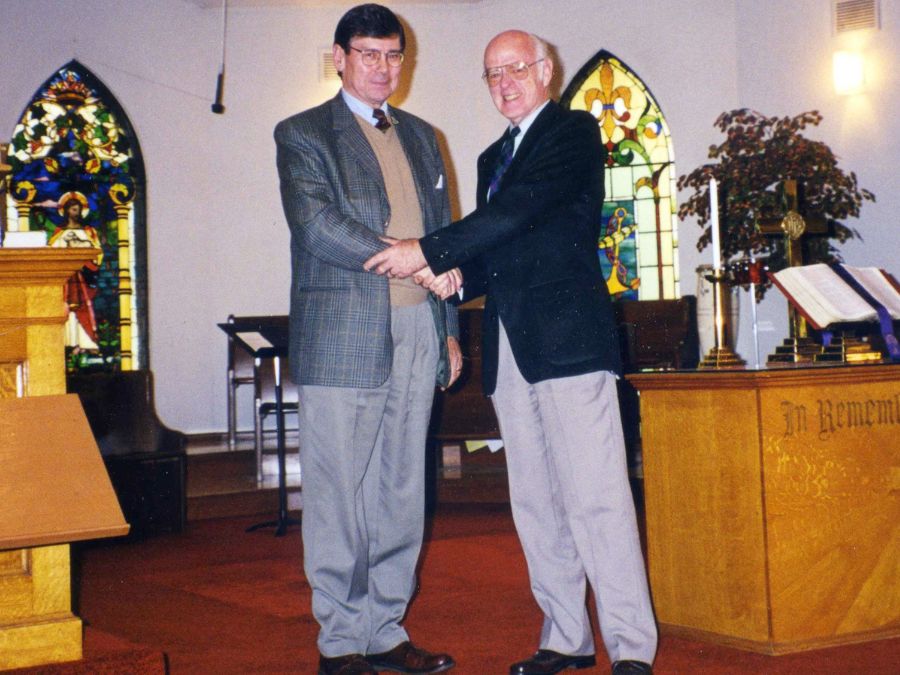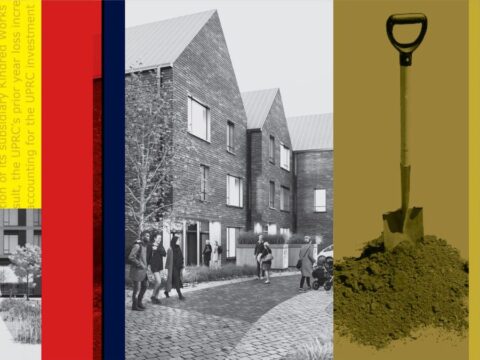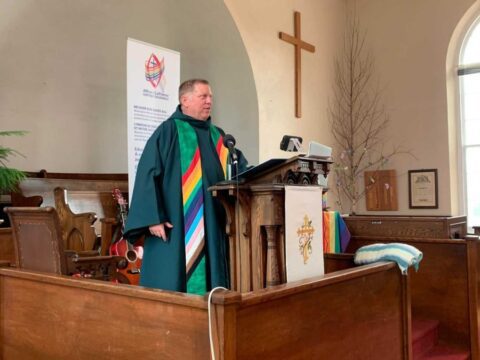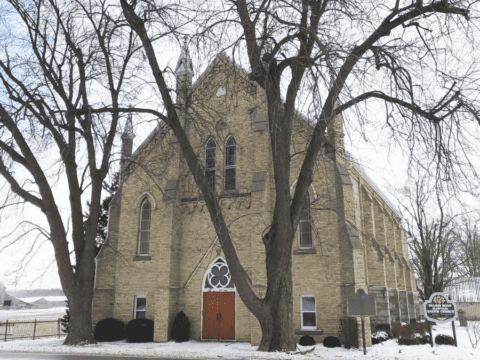Content warning: This story discusses an organization opposed to the ordination of queer people. Take care when reading.
Within evangelical circles of the United Church, there’s an oft-repeated story about the day Graham Scott heard the news that the 32nd General Council had voted to allow openly gay and lesbian ministers to be ordained or commissioned. As the legend goes, he tore his clothes, rending them in sadness like the prophets of old (though, some accounts admit that he merely ripped his pocket). Regardless of the details, that day in August 1988, Scott’s gesture captured the feelings of grief and failure experienced by many in the church’s self-described “evangelical remnant.”
You may unsubscribe from any of our newsletters at any time.
Only a few months earlier, Scott — then president of a United Church reform group called Church Alive — along with Bill Fritz, who was involved in the United Church Renewal Fellowship, banded together to form the Community of Concern (CoC). Both of these original groups were concerned with what they perceived as a move away from theological rigour in the church, and concerned that the United Church had abandoned the 20 Articles of Faith it had commissioned when the denomination was originally formed. CoC’s purpose, in keeping with these groups’ calls for renewal, would be to oppose the ordination and commissioning of gay and lesbian people in the United Church.
Major strides have been made on 2SLGBTQ+ rights in The United Church of Canada in the 37 years since its 1988 decision to allow openly queer clergy. But this coming August, at the 45th General Council meeting, the denomination plans to deliver a formal apology to the 2SLGBTQ+ community that will address practices and polity, both past and current, that have led to 2SLGBTQ+ discrimination within the church. I first heard about Community of Concern while working in the Pacific Spirit Regional Council Archives as a summer student. I was shocked. I had never heard about this group before, in spite of growing up in the United Church and coming out as queer in my late teens. It struck me that in order to apologize for the hurts we have caused as a church, we must be willing to look our history in the face and understand the lengths that people would go in order to oppose the 1988 decision.
The first thing CoC did when they heard about the March 1988 report called Toward a Christian Understanding of Sexual Orientations, Lifestyles and Ministry, which recommended that gays and lesbians be eligible for ordination, was mail out a declaration of dissent to every minister in the United Church. “We are concerned with the costs in suffering and depersonalization which our increasingly permissive society entails,” the document read.
By the time the General Council happened in Victoria five months later, they had collected 33,000 signatures — including those of 1,022 ministers and four past moderators, and presented them to the gathering. Despite the wide-ranging support for CoC’s petition, General Council voted to affirm that all members of the United Church, regardless of their sexuality, were eligible for ministry.
Rev. Douglas Bacon was the minister at West Point Grey United in Vancouver in the 1980s. Bacon, who is gay but wasn’t out at the time, remembers that a beloved member of his congregation — who was also a member of CoC — threatened to leave the church over the decision. He called her up and implored her to stay. “You are family,” he told her.
“Family doesn’t always get along,” he remembers her saying in response. Bacon’s congregation was among many that fractured following the 1988 decision.
CoC continued to meet after 1988
While CoC’s membership in the late 1980s and ’90s was robust, with some members estimating that it exceeded 50,000 people, by the turn of the millennium, its membership began to shrink. Subscriptions to CoC’s magazine (called Concern) dropped. In the wake of the 1988 decision, some of the more conservative members of CoC decided to leave the United Church altogether and join more conservative denominations. But others, frustrated with what they perceived as a lack of change effected by CoC, stopped supporting the organization’s work.
More on Broadview:
- How white evangelicals incite homophobia in Uganda
- This gospel choir welcomes queer and trans people
- Her church cast her out for being gay. 30 years later, it made amends.
In spite of their decline, CoC remained hopeful. “We have made a difference,” they wrote in their magazine, Concern, in 1996. “Not as much as our souls have liked, but we have had a braking effect on the national church’s ultra-liberal agenda.” They cited the loss of church members in the 1980s and ‘90s and diminishing church funds as proof that their work of challenging and highlighting the United Church’s “headlong rush into apostasy” was making a difference. For these members, it was important not to leave the denomination. “Just as the prophets did not leave Israel, the faithful evangelical remnant must not leave the United Church or other denominations infected by the homosexual ideology,” they wrote.
Community of Concern folded in the early 2010s, pooling their remaining resources with those of other revival groups (including National Alliance of Covenanting Congregations, the Renewal Fellowship and Church Alive) to create an annual, in-person event called Cruxifusion that supports “Christ-centred leaders and congregations within the United Church.” Cruxifusion’s website says that the groups’ money came with no strings attached.
Rev. Greg Smith-Young, a past chair of Cruxifusion who has been involved since its inception, says that the informal group, which includes self-described orthodox, evangelical and conservative members, decided years ago that “our position [on 2SLGBTQ+ issues] would be no position, because we don’t exist to be a political issue.”
“There are members of our group that are for and against, but our existence is simply to lift up Jesus and celebrate Jesus’s work in The United Church of Canada,” he says. This year’s gathering in Toronto drew 52 people, and the Cruxifusion Canada Facebook group has more than 200 members.
Smith-Young says that Cruxifusion has 2SLGBTQ+ members, including some who have been on its board. Fellow past chair Rev. Nick Phillips says that new queer and trans members are “absolutely” welcome to join.
“Both my [young adult] children are queer… and that’s very important to me,” Smith-Young says. “And then in Cruxifusion, there are people who would disagree with that, and what we’ve said is we’re going to hold each other in love.”
Reflecting on the legacy of the CoC, Rev. Michiko Bown-Kai said that “trust was broken and it’s been hard for people to imagine that the people sitting in the pews beside them on Sunday would feel so strongly about excluding people from church that they would organize in that way.” Bown-Kai has done Affirming work in the United Church for the past 10 years, including as part of the task group for the upcoming apology.
“I also think it is a pain that has been stuck in time without much opportunity for open and honest conversations,” they said. “Without the tools congregations needed to talk through conflict, hurts were often left unaddressed, without closure or healing.”
With files from Emma Prestwich.
EDITOR’S NOTE: This story was updated on July 29 to add additional details about Cruxifusion.
***
Bailey Bjolin (she/her) is a master of divinity student at the Vancouver School of Theology.














